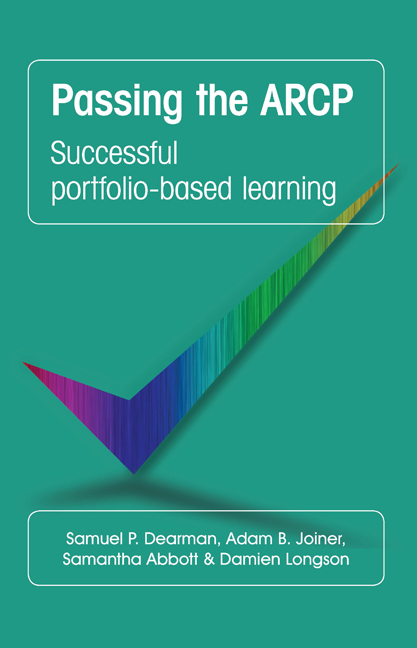Book contents
- Frontmatter
- Contents
- Authors
- List of figures
- Foreword
- Preface
- Acknowledgements
- List of abbreviations
- How to use this guide
- 1 Quick reference guide
- 2 What is a portfolio?
- 3 Lessons learned so far
- 4 Organising the portfolio
- 5 Managing your workplace-based assessments
- 6 Reflective practice and self-appraisal of learning
- 7 Audit and research
- 8 Teaching
- 9 Psychotherapy experience
- 10 Management and leadership experience
- 11 Appraisal reports, planning meetings and educational objectives
- 12 Other experiences, achievements and documents
- 13 The future of portfolios
- Index
5 - Managing your workplace-based assessments
- Frontmatter
- Contents
- Authors
- List of figures
- Foreword
- Preface
- Acknowledgements
- List of abbreviations
- How to use this guide
- 1 Quick reference guide
- 2 What is a portfolio?
- 3 Lessons learned so far
- 4 Organising the portfolio
- 5 Managing your workplace-based assessments
- 6 Reflective practice and self-appraisal of learning
- 7 Audit and research
- 8 Teaching
- 9 Psychotherapy experience
- 10 Management and leadership experience
- 11 Appraisal reports, planning meetings and educational objectives
- 12 Other experiences, achievements and documents
- 13 The future of portfolios
- Index
Summary
Workplace-based assessments have become a common formative assessment tool in all areas of postgraduate medical education. There is no pass/fail, so WPBAs should provide feedback to trainees about developing skills required to carry out their work competently. Workplace-based assessments may also highlight areas that require more attention and so can inform future PDPs. They have become an important part of postgraduate medical training as they are considered to demonstrate effective and frequent review and appraisal of trainee doctors. They test an individual's skills, knowledge and behaviour against GMC-approved curricula (General Medical Council, 2010) in a wide variety of clinical contexts and allow trainees to demonstrate progress in their skills in their workplace. Workplace-based assessments also have the opportunity to identify trainees who are struggling, as mandatory WPBAs oblige closer supervision than would otherwise exist without them. Assessment of competence in this way can be argued to be an obligation of professionalism and professional duty, given that the public has expressed a desire for improvements in self-regulation (Cruess & Cruess, 2006).
Workplace-based assessments have their limitations too, such as not being reliable as the only source of assessment for trainees and being completed to ‘get the numbers’, rather than using a WPBA as a valuable educational experience for which it is intended. Many WPBAs require assessors to rate trainees on a number of different scales. Low scores can leave trainees feeling like they have failed, despite the formative nature of WPBAs. Senior clinical staff and educational supervisors can often struggle to find the time to complete WPBAs, so a supervisor must be prepared to make time to observe and provide feedback. Finally, standardising judgement can be difficult (General Medical Council, 2010) and so WPBAs may not be as reliable as summative assessments.
The WPBA is one of the cornerstones of assessment structure. The requirements in terms of numbers per training post are actually relatively small when one takes time to reflect on the number of competencies a trainee is expected to demonstrate each year. When used well the WPBA is very helpful and can cover a wide range of competencies. Workplace-based assessments cover a variety of skills and information, and the upshot of this is that they convey a great deal about a trainee's skills.
- Type
- Chapter
- Information
- Passing the ARCPSuccessful Portfolio-Based Learning, pp. 28 - 32Publisher: Royal College of PsychiatristsFirst published in: 2017



